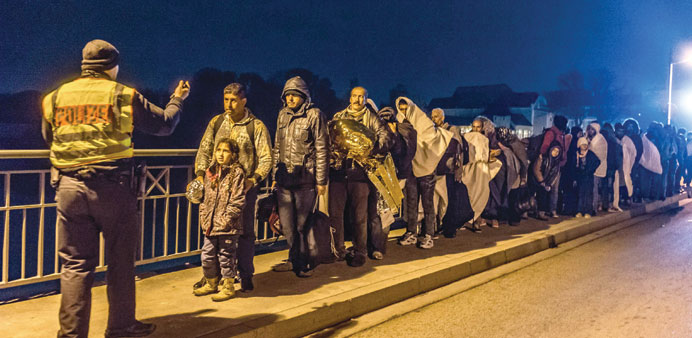AFP/Brussels
Southeast European countries facing an unprecedented influx of migrants reacted cautiously yesterday to new EU plans to help stem the crisis, following an emergency mini-summit at the weekend.
The European Union pledged to help set up 100,000 places in reception centres along the migrant route through the Balkans, in a bid to defuse the rising tensions on its eastern frontier as tens of thousands pass through on their way to northern Europe.
A 17-point plan, announced after emergency talks between the heads of 10 EU nations and non-EU Albania, Serbia and Macedonia, including an undertaking that no country will let migrants through to an adjoining state without first getting their neighbour’s agreement.
Another key element of the plan is to speed up information exchanges between countries to coordinate their efforts.
“It is crucial that commitments are fulfilled in practice. If that does not happen (from Monday), the situation will not improve significantly,” Slovenian Prime Minister Miro Cerar told reporters after the meeting late on Sunday.
“In such a case, we continue along the path that I referred to at my arrival,” he said, in reference to his comments ahead of the summit that the EU would start “falling apart” without immediate, concrete actions.
More than 670,000 people have reached European soil this year - many of them fleeing violence in Syria, Iraq and Afghanistan - in the continent’s worst migration crisis since World War II.
Some 3,000 have died making the dangerous Mediterranean sea crossing and, with winter fast approaching, the fear is that more could face the same fate on the land route through the Balkans.
Tensions have also grown after Bulgaria, Romania and Serbia warned over the weekend they could close their borders to stop them becoming a “buffer zone” for the streams of people entering Europe every day.
Macedonian President Gjorge Ivanov warned that his tiny Balkan nation, a key transit state, could host a maximum of 2,000 migrants if crossing points were shut down.
“We can only be a transit country. Macedonia has no capacity to be able to keep a larger number of refugees on its territory if the corridor is closed,” Ivanov told journalists after the meeting in Brussels, local media reported.
He also said Macedonia had “no financial aid” and suffered from “a lack of valuable information” as it was not an EU member.
The EU’s new reception places, to be provided with the help of the UN’ refugee agency, the UNHCR, will help provide shelter and speed up registration of migrants, according to European Commission President Jean-Claude Juncker.
Some 50,000 places will be created across Balkan countries such as Macedonia and Serbia, while the other half will be located in Greece.
“The uncontrolled flow of people must be stopped,” Juncker told a press conference after the summit. “It cannot be that in the Europe of 2015, people are left to fend for themselves, sleeping in fields.”
Most migrants land first in Greece but, desperate to get to Germany and wealthier northern European countries, thousands have pushed on rather than staying there to have their asylum applications processed as is required under EU rules.
Moving up through the Balkans they have overwhelmed many countries, with Hungary sealing border crossings with Serbia and then Croatia to halt the flow into the country.
Croatian Prime Minister Zoran Milanovic said after the summit that Brussels’ plan for bolstered help from the EU border agency Frontex could also help to control the situation - but he too had reservations.
“In theory it should slow down the influx and flow of people due to a slightly more rigorous procedure, but under the presumption that everything functions from Greece across Macedonia to Serbia,” Milanovic told reporters. “If not, things will continue as they are until this story is over.”
Budapest’s border closures have sparked tensions with Brussels, fellow EU members and particularly its neighbours, with tiny Slovenia swamped by more than 73,000 migrants since mid-October.
According to police data, there were some 12,000 in the country’s accommodation and registration centres yesterday morning.
Fears are rising that the crisis is threatening the cherished Schengen system of borderless travel, one of the bedrock achievements of the EU since it was founded in the chaos following World War II.
There is a clear split in the EU over how to best handle the crisis. Some view it mainly as a border security problem, while others believe it is a humanitarian challenge.
While the diplomatic wrangling continued, urgent appeals for help for refugees came from humanitarian workers such as French volunteer Jerome Pelloussat at the Croatia-Serbia border.
“They need help now, so someone has to react now. They are people who were like us just until recently - they were teachers, heads of companies, masons and they lost everything in just a day,” he told AFP.

A policeman gestures to refugees waiting in line on the Innbruecke bridge at the German/Austrian border at Simbach am Inn late on Sunday.
